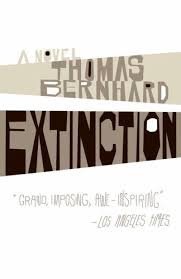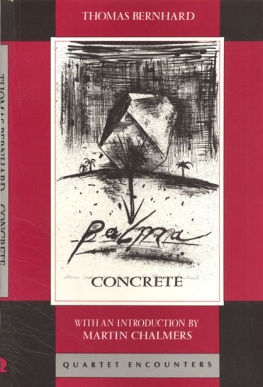Thomas Bernhard
Extinction
I feel death ever pinching me by the throat, or pulling me by the back.
Montaigne
On the twenty-ninth, having returned from Wolfsegg, I met my pupil Gambetti on the Pincio to discuss arrangements for the lessons he was to receive in May, writes Franz-Josef Murau, and impressed once again by his high intelligence, I was so refreshed and exhilarated, so glad to be living in Rome and not in Austria, that instead of walking home along the Via Condotti, as I usually do, I crossed the Flaminia and the Piazza del Popolo and walked the whole length of the Corso before returning to my apartment in the Piazza Minerva, where at about two oclock I received the telegram informing me that my parents and my brother, Johannes, had died. Parents and Johannes killed in accident. Caecilia, Amalia, it read. Holding the telegram, I kept a clear head, walked calmly to my study window, and looked down on the Piazza Minerva, where there was not a soul in sight. I had given Gambetti five books that I thought would be useful and necessary to him in the next few weeks, telling him to read them slowly and carefully: Jean Pauls Siebenks, Kafkas The Trial, Thomas Bernhards Amras, Musils The Portuguese Woman, and Brochs Esch or Anarchy. I opened the window so that I could breathe more easily and reflected that I had been right to give Gambetti these five books rather than any others, since he would find them increasingly important in the course of our lessons. I also remembered telling him in passing that next time we would discuss Elective Affinities and not The World as Will and Idea. It was a delight to talk to Gambetti again after the dreary and labored conversations I had had with my family at Wolfsegg, all of them confined to day-to-day concerns of a wholly private and primitive kind. German words hang like lead weights on the German language, I had said to Gambetti, and constantly drag the mind down to a level that can only be harmful to it. German thought and German speech soon become paralyzed under the intolerable weight of the language, which suppresses any thought before it can find expression. Under the German language, I said, German thought had developed only with difficulty and never come to full efflorescence, as Romance thought had under the Romance languages as witness the centuries of effort that the Germans had invested in their thinking. Although I have a higher regard for Spanish than for Italian, no doubt because I am more familiar with it, Gambetti that morning illustrated yet again the lightness, effortlessness, and infinite versatility of Italian, which bears the same relation to German as a child reared in complete freedom, in a happy and prosperous home, bears to one who has been cowed and beaten into low cunning in the poorest of poor families. How much more highly, then, must we rate the achievements of our philosophers and writers? I asked. Every word inexorably drags their thought down, every sentence forces to the ground whatever they venture to think, and thus forces everything to the ground. Thats why their philosophy and their writings are so leaden. Using my hands to simulate a balance, the left representing the German scale and the right the Italian, I quoted a sentence from Schopenhauers The World as Will and Idea, first in German and then in Italian, and showed Gambetti how the German scale sank and the Italian sprang up. For his amusement, as well as my own, I recited a number of sentences from Schopenhauer, first in German and then in an extempore Italian translation, weighing both versions in my hands and making what was at first intended as an object lesson into a kind of bizarre game, concluding with some sentences from Hegel and an aphorism from Kant. The sad thing is, I told Gambetti, that heavy words and heavy sentences are not always the weightiest. The game soon exhausted me. Standing in front of the Hotel Hassler, I gave Gambetti a brief account of my recent visit to Wolfsegg, which in the end struck me as excessively circumstantial and inconsequential. My aim had been to compare our two families, to contrast the German element in mine with the Italian in his, but in fact all I did was to play off my family against his; this was bound to distort what I wanted to say and to strike Gambetti as disagreeable and confusing rather than instructive and informative. Gambetti is a good listener and has a fine ear, trained by me, for the truth and logic of what he is told. Gambetti is my pupil, but conversely I am Gambettis. I learn at least as much from him as he learns from me. We have an ideal relationship: sometimes I am his teacher and he my pupil, but at other times he is my teacher and I his pupil. And there are times when neither of us knows who is the pupil and who the teacher. That is the ideal situation. Officially, of course, I am always Gambettis teacher, and for this I am paid by Gambetti, or rather by his well-to-do father. Only two days after returning from the wedding of my sister Caecilia and the wine cork manufacturer from Freiburg, who is now my brother-in-law, I thought, looking down at the deserted Piazza Minerva, Ill have to repack my suitcase, which I unpacked only yesterday and didnt even put away but left on the chair by my desk; Ill have to return to Wolfsegg, which has in recent years become more or less repugnant to me and this time not for a ridiculous and grotesque occasion but for one that fills me with dread. Instead of discussing Siebenks or The PortugueseWoman with Gambetti, I told myself, Ill be at the mercy of my sisters, who are expecting me. Instead of talking to Gambetti about ElectiveAffinities Ill have to talk to my sisters about the funeral and the inheritance. Instead of walking up and down the Pincio with Gambetti, Ill have to visit the registry of deaths and the cemetery and quarrel with my sisters over the funeral arrangements. As I packed the clothes that I had unpacked the night before, I tried to work out what consequences the death of my parents and my brother would have, but I arrived at no conclusion. I was naturally aware, however, of what was now required of me after the deaths of the three people who were closest to me, at least on paper all my strength, all my willpower. The calm with which I gradually stuffed whatever I needed for my journey into the suitcase, while taking stock of the disruption that this undoubtedly dreadful calamity would cause in my immediate future, did not strike me as at all unnatural until long after I had shut the suitcase. The question of whether I had loved my parents and my brother was one that I at once fended off with the word naturally, but it remained fundamentally unanswered. For ages I had not had what is called a good relationship with either my parents or my brother but had one marked by tension and, in recent years, indifference. The truth is that for a long time I had wanted to know nothing about Wolfsegg or about them, and they, conversely, had wanted to know nothing about me. Hence our mutual relations were more or less confined to the exigencies of existence. Twenty years ago, I thought, your parents not only released you from Wolfsegg, after wanting to chain you there for life, but dismissed you from their feelings. During these twenty years my brother had envied me for having left Wolfsegg, for my megalomaniac self-sufficiency, as he once put it, and hated me for my relentless insistence on freedom. My sisters distrust had always exceeded the bounds of what is acceptable among siblings, and when once I turned my back on Wolfsegg, and therefore on them, they too pursued me with their hatred. This is the truth. I picked up the suitcase. It was, as usual, too heavy. I really dont need it, I thought, as I have everything I need at Wolfsegg. Why cumber myself with a suitcase? Having decided to travel without a suitcase, I proceeded to unpack my clothes and return them, item by item, to the closet. Its natural to love ones parents, and its equally natural to love ones brother and sisters, I thought, standing by the window again and looking down on the deserted Piazza Minerva. We therefore fail to notice that from a certain moment onward we hate them, without wanting to, just as naturally as we previously loved them, for all kinds of reasons that we become aware of only years later, often decades later. We cant determine precisely when we stopped loving them and started hating them, and we dont try, basically because we are afraid to. Anyone who leaves his family, against their will and as implacably as I left mine, has to reckon with their hatred, and the greater their previous love for him, the greater their hatred when he has done what he swore to do. For decades their hatred caused me suffering, I reflected, but I havent suffered from it for years now; Ive become used to it and it no longer hurts me. And their hatred of me inevitably led me to hate them, but in recent years they havent suffered from my hatred either. They despised me,












